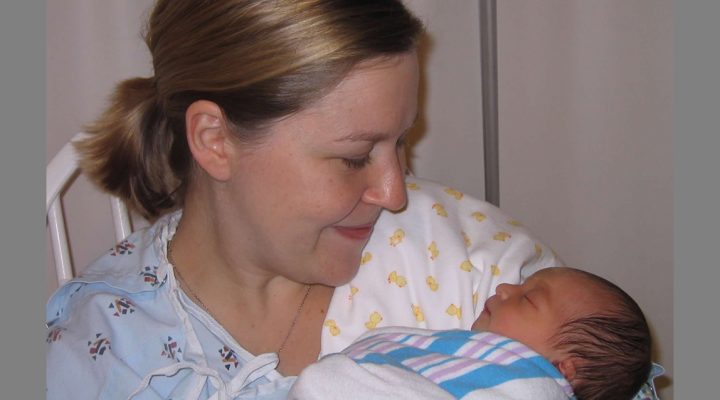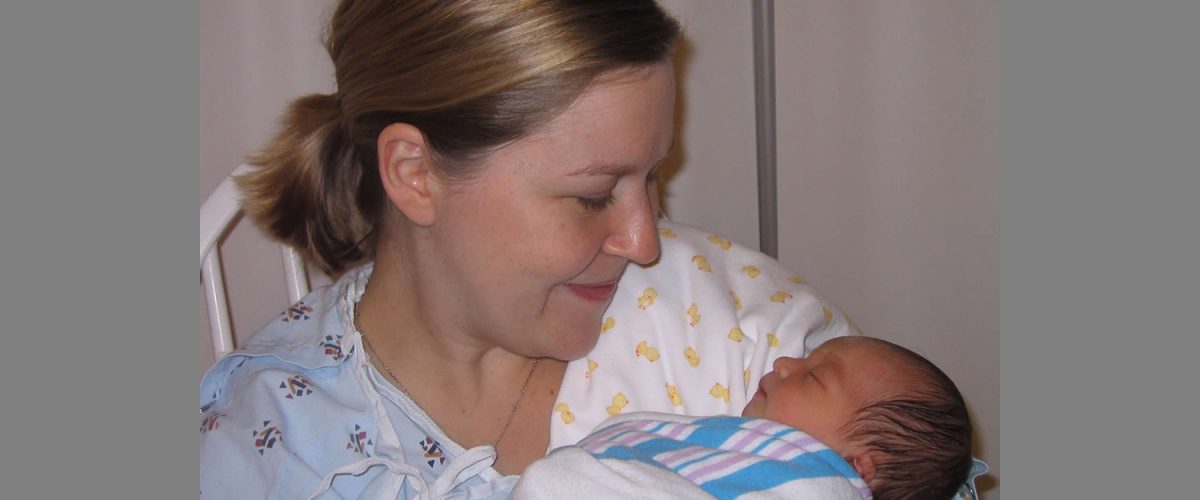Editor’s note: Normally we place the writer’s bio at the end, but for this piece you need to know up front who you are reading and why it matters. Ann Bell Worley is a Houston-based writer and editor and a mother of two with a background in theological education and ministry. Her son, now 15, was born with an incredibly rare genetic variant (1 in 100,000) and later diagnosed with PANS, Pediatric Acute-onset Neuropsychiatric Syndrome. Gray Colored Glasses, her website, blog and forthcoming podcast, aims to raise awareness of PANS, a little-known although not uncommon neuroimmune disorder estimated to impact one in 200 children and youth, and to generate understanding and compassion for medically complex children and their families.
Something about January makes me want to start at the very beginning. But as much as I want to tell our story with Isaac, I also face some very real fear every time I go to write about it. My early days (turned years) of motherhood were so lonely and painful and different from what I expected that I still avoid going there.
I don’t remember how old Isaac was, maybe 4, when a casual acquaintance recommended a book to me written by a mother whose daughter has Down syndrome. I read the first couple chapters of the book and then put it down. The author talked briefly about the surprise of learning her daughter’s diagnosis and quickly pivoted to what a gift she was and how she as a mother was able to embrace and celebrate her child. And as much as I might wish that’s the way my feelings worked, it was not at all true to my experience.
I never read the rest of the book. And I rarely talk about how I felt in those first days, months, years, suspecting and then confirming that something was different about Isaac. Don’t get me wrong, I’ve hashed it out in therapy, talked about it in bits and pieces, maybe been more revealing with one group or another or one small part of my story. But somehow, being totally honest about what was going on in me during that time is still hard.
“There are new parents out there who need to know they are not alone with these hard emotions.”
There are new parents out there who need to know they are not alone with these hard emotions, that they don’t need to feel shame and isolation on top of everything else that makes it hard to get through the day.
I suspect most of it is that I never want anyone to doubt — even for a second — my love for my child. Especially if my children ever read what I write. I don’t want to risk being thought of as too selfish, too small, unmotherly, un-Christian. And of course, there’s also the fear that comes with any attempt to share something so deeply personal, especially when I consider myself a fairly private person.
But I also have a deep well of compassion for what I was going through at that time that I want to share, especially with mothers but also with family members and others who may have no idea what is happening in the inner life of their daughter/sister/friend.
I have no doubt there are new parents out there who need to know they are not alone with these hard emotions, that they don’t need to feel shame and isolation on top of everything else that makes it hard to get through the day. And it can only help for people who haven’t had this kind of experience to “overhear” how devastating it can be. We become better people when we listen to each other’s stories.
The power of stories
I read another woman’s story just last week that gives me renewed courage to be candid about my own. Interestingly enough, Bethany Van Delft is another mother whose daughter was born, like the author I refer to above, with Down syndrome. But Van Delft speaks with arresting honesty about the fear, anxiety, loneliness, shame, anger and despair she experienced as a new mom. It’s a short offering, but she makes the difficulty of having a child with disabilities abundantly clear, which makes her ultimate acceptance of it that much more profound.
I highly recommend her story, “Light and Hope,” which I read in The Moth Presents All These Wonders: True Stories About Facing the Unknown, edited by Catherine Burns. You can also listen to the podcast here. (If you’re not familiar with the Moth, it’s a fabulous storytelling movement with live StorySLAM events across the United States and several other countries.)
The beginning of life with Isaac
Even as I aim to bring awareness to PANS, which is a huge part of our family’s story, there is another, equally weighty story that precedes it. This is the beginning.
“Most babies are screaming when they come out, but not Isaac.”
Isaac was born on August 15, 2008: 40 weeks, 4.5 pounds, and 4 million questions. Most babies are screaming when they come out, but not Isaac. I remember the doctor calmly telling us, “It’s a boy,” because we’d waited to find out. And then Isaac came into the world in absolute silence.
Time seemed to stand still. Too still. Until all of a sudden, about a dozen people rushed into the room, and I remember the movement, people turning, someone shouting, “We need to intubate!” But right after those words, without intubation, Isaac cried. From his first breath, he made it clear he would do things on his own timeline.
For just a minute, they put Isaac in my arms, and we locked eyes. And he was peaceful, staring at me, and I remember thinking I would love this baby my whole life. And also, that he seemed like a stranger to me, someone I didn’t know yet, couldn’t fully understand.
 Then they weighed him, and he was inexplicably small. And they whisked him away to the ICU, asking Todd, “Do you want to go with the baby or stay with Mom?” I suppose the right answer is to go with the baby, but I remember saying to him, “Stay with me.” Because I just couldn’t imagine him leaving, too, after what had just happened.
Then they weighed him, and he was inexplicably small. And they whisked him away to the ICU, asking Todd, “Do you want to go with the baby or stay with Mom?” I suppose the right answer is to go with the baby, but I remember saying to him, “Stay with me.” Because I just couldn’t imagine him leaving, too, after what had just happened.
I knew better than to write a birth plan, because it’s just inevitable things will happen that are out of your control. But I really never imagined any kind of complication, like the cord around his neck. I never imagined my baby wouldn’t be laid on my chest immediately, where we could hold him forever. I never imagined that it wouldn’t be perfect in its own way.
I think Todd stayed for just a minute, enough to comfort and reassure me before he left to be with Isaac. And I’ve seen a photo of Todd in the waiting room, telling our parents and his sisters we had a boy. But his eyes are closed in the snapshot, and he’s holding back tears. And we know they aren’t just tears of joy.
Our families had seen the rush of doctors go down the hallway and wondered what was happening. But hey, there was a new baby! They were thrilled. We were shaken.
I remember the doctor saying they couldn’t take me to the NICU yet because of the epidural. I would just fall over if they put me in a wheelchair. They brought me a tray of food, and I ate it all. I was famished. I drank coffee for the first time in months. I was in good spirits, but it was weird. I was still just me. I remember my in-laws coming in for a brief visit and then saying they were going to the NICU to see the baby. And I remember feeling angry.
“I remember finally going to see Isaac and holding him, loving him, staring at his tiny little features, and thinking this isn’t how it was supposed to be.”
I remember finally going to see Isaac and holding him, loving him, staring at his tiny little features, and thinking this isn’t how it was supposed to be.
We stayed another night in the hospital. The doctor came by the next morning and asked if Todd was rounding on patients. He was kidding, but he was right. Todd was chief surgery resident at the hospital, and he got up the next morning and made rounds. I was upset about that, too, at the time, but now I understand he was coping just like I was. He was doing what he knew how to do.
My parents were there, too. I remember expressing some of my feelings to my mother and her listening to me, being compassionate. I’m so grateful for that.
Going home
Isaac was in the NICU for four days, and we spent most of our time there until we could finally bring him home. He was healthy, they said. No reason for concern, they said. Yes, he was small. Intra uterine growth restriction (IUGR), but there’s no explanation. It happens sometimes. Follow up with a pediatrician. Here’s one we recommend. It will all be OK.
I thought I would feel a sense of fullness when we came home from the hospital, because we had a baby, because we were growing our family. Instead, I felt gutted. This wasn’t at all what I expected when I was expecting.
There had to be a reason Isaac was so small. I was terrified there was something wrong with my baby. And I would live with that fear in the back of my mind until we finally got an answer 15 months later, and the fear was fully realized.
But that’s a story for another post.
I loved my baby from the moment I saw him, and I love him still. I love him fiercely. Yes, it is all OK, but not because I’ve accepted everything as it comes. I’m just not wired that way, and Todd isn’t either. We have fought our way through complex emotions and complex diagnoses and every unexpected twist and turn, and there have been many.
But we are not the same as we were at the beginning of our story. We are different people because of Isaac.
For the condensed version of Isaac’s medical diagnosis with PANS, see The Short Story.


